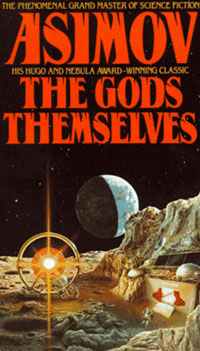I re-read The Gods Themselves because it was 1972’s Hugo winner, and all I could remember about it was three gendered aliens, which didn’t really seem fair. The part of the book I remembered is the middle. It does indeed have three gendered aliens feed on energy. Their genders are left, right, and mid, or parental, logical and emotional. Their sex is very weird but it’s described in detail—it’s as if Asimov read that Tenn story about alien amoeba porn and thought “I could write that!”
Asimov didn’t often do aliens, but he does them very well here. It’s almost Tiptree-esque, and when I say that I am thinking of “Love is the Plan, the Plan is Death.” They feel alien and they feel like people and they have odd weird lifecycles. I could have lived without the emotional one being “she” but since the parental one is “he” and making up pronouns gets clunky fast I guess it’s reasonable. This really is a good novella about three gendered aquatic aliens. It’s a pity it’s buried in the rest of the book, which turns out to be deeply disappointing.
Everybody who complained about the physics in Anathem? I hope you complained just as loudly about the physics in The Gods Themselves, because it’s wrong in exactly the same ways and much less entertainingly. I checked this with two actually scientist type people, because Asimov was a chemist and a hard science fiction writer and I didn’t want to trust the evidence of my own lying eyes, but here we have alternate universes with different physics in contact with each other and with different atoms and energy and messages and actual physical metals being exchanged between them, and this is really scientifically silly. Pu-187? I think not.
But you know if I’m complaining about the science that means there’s something else wrong, because if I like a book I’m prepared to overlook the most ridiculous scientific errors. What’s wrong here is that the human parts are boring. The first part is about squabbling scientists and the discovery of the pump shuffling energy between universes. This is frankly dull, and its one redeeming feature is that it’s fairly short. The third part is set on the moon, and it’s somewhat more interesting than the first part but it has a kind of deus ex machina solution to the problem, which makes it all seem pointless. (I also thought it had been visited by the sexism fairy.)
I do like a lot of Asimov, but this is far from being his best work. However, it won the Hugo and the Nebula and the Locus Award, so an awful lot of people must have loved it in 1973. I’ve tried to see what’s good in it—but really, it’s just the aliens. Maybe the aliens were enough to carry the whole book for some readers? They’re certainly the memorable part. And they’re still worth reading—that section grabbed me. I kept reading the rest in the hope that we might see them again before the end, and was disappointed. So I shake my head and disagree with the voters of 1973.
If you like it, like the whole book as a novel, not just the alien section as a standalone story, I’d be very interested to hear you explain why.
Jo Walton is a science fiction and fantasy writer. She’s published two poetry collections and nine novels, most recently Among Others, and if you liked this post you will like it. She reads a lot, and blogs about it here regularly. She comes from Wales but lives in Montreal where the food and books are more varied.










